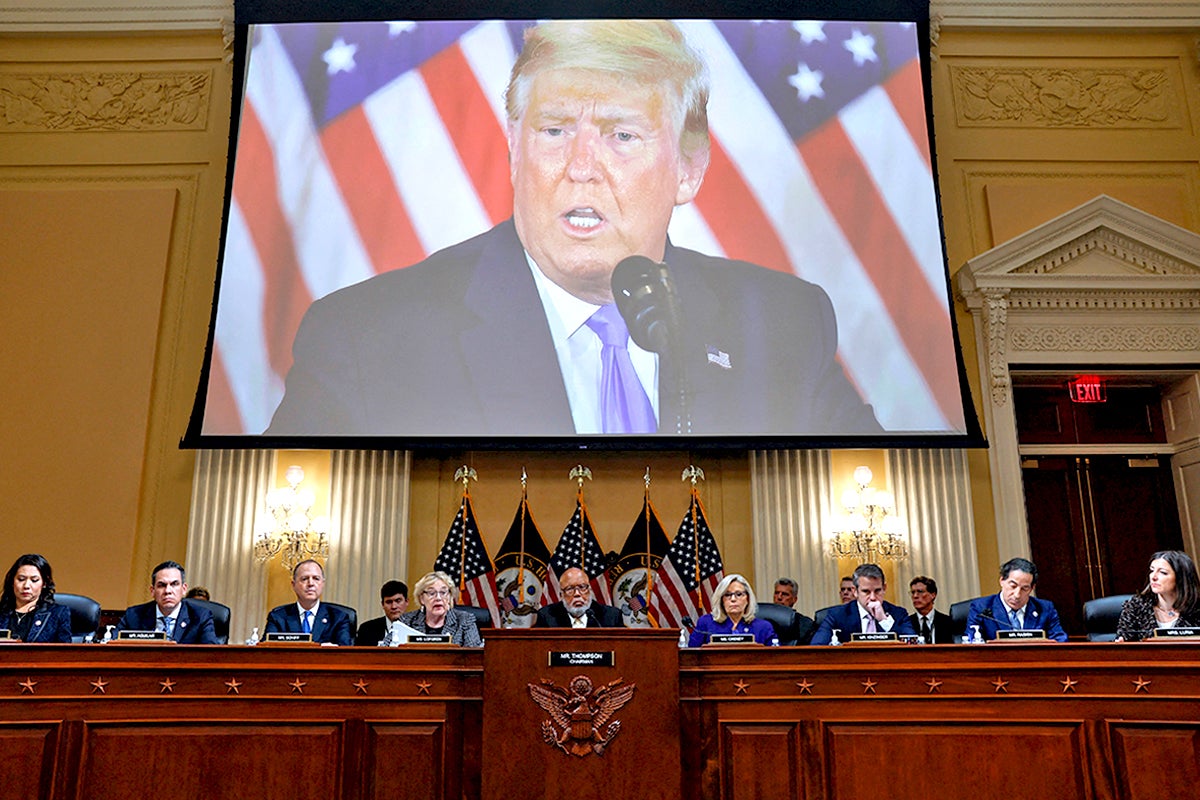The case for prosecuting Donald Trump
As the January 6 Committee comes to a close, one thing can be definitively said – the country is different than when it first convened


Donald Trump continues his spree of making presidential corruption history.
The January 6 committee just recommended four criminal charges for Trump: obstruction of an official proceeding; inciting, assisting, aiding, or comforting an insurrection; conspiracy to make a false statement; and conspiracy to defraud the government.
Charges were also recommended for Trump’s former lawyer John Eastman. Notably, four GOP congressmen – Reps Kevin McCarthy, Jim Jordan, Scott Perry, and Andy Biggs – were referred to the House Ethics Committee for failing to comply with subpoenas. This is the first time a president has ever faced a criminal referral from Congress, and the January 6 Committee did not hold back.
Monday’s final public meeting was the culmination of a 17-month investigation, which included interviews with over 1,000 witnesses and the review of hundreds of thousands of documents. Over the course of 10 public hearings, this historic select committee took on the herculean task of telling the truth about the January 6 insurrection and making the case for accountability to the public and the Justice Department (DOJ). While the committee is set to be disbanded by the incoming House Republican majority, they can conclude their proceedings knowing they succeeded in more ways than one.
This criminal referral against a former president is unprecedented but necessary. The wide-ranging charges the January 6 committee chose to refer are the equivalent of throwing the kitchen sink at Trump. To be clear, a congressional criminal referral isn’t the same as an indictment. Congress doesn’t have that power. These criminal referrals are essentially a notification to the DOJ and an official historical record that Congress believes the former president committed crimes. Whether these criminal referrals will amount to real-world accountability is yet to be seen.
The matter is already in the hands of Attorney General Merric Garland’s DOJ, which recently appointed Jack Smith as special counsel to oversee high-profile January 6 cases and the Mar-a-Lago probe into Trump’s alleged theft of classified documents. While these Trump-related cases have been placed under the jurisdiction of Special Counsel Smith, the DOJ continues to actively investigate and prosecute other lower-level January 6 cases. Some of their recent prosecutions have been successful, and are incredibly relevant.
The Oath Keepers were recently convicted of some of the same charges the January 6 Committee just referred against Trump. The Justice Departmentrecently went five for five on the charge of obstruction of an official proceeding in their prosecution of Oath Keeper leaders, including Stewart Rhodes. Rhodes was primarily involved in the planning of the attack on the Capitol and did not participate in the violence personally. The fact he was still convicted by a jury of his peers on charges that include seditious conspiracy and obstruction bolsters the likelihood that the DOJ may prosecute perpetrators higher up in the plot – including Trump.
After covering every single one of these hearings, I believe the January 6 Committee definitively proved that Trump engaged in a multifaceted effort to overturn the 2020 election. In Monday’s meeting, the January 6 Committee further hammered that point by playing a summary video highlighting Trump’s entire scheme, using witness testimony and January 6 footage. The case was familiar: Trump knowingly spreading election lies; pressured state officials, the DOJ, and Vice President Mike Pence; then used violence as a tool on January 6 and did nothing to stop it.
As countless legal experts have pointed out, the key to prosecuting a criminal case of this nature is criminal intent. The January 6 Committee spent a significant amount of time during their hearings highlighting Trump’s alleged criminal intent. Witnesses claimed Trump admitted that he knew he lost, knew his supporters were armed but directed them to the Capitol anyway, and did nothing to subdue the mob after they were attacking the Capitol.
Rep Jamie Raskin also sought to bolster the criminal case by citing Judge Carter’s ruling that stated Trump and Eastman “more likely than not” committed obstruction and conspiracy in their bid to obstruct Congress’s ability to count the electoral votes in the 2020 election
We’ll see if Special Counsel Smith, who will have the final report from the January 6 committee and mountains of evidence the DOJ has gathered separately, decides to hold the former president criminally responsible for the insurrection. But perhaps the January 6 committee has already succeeded in one of its key missions.
Millions of Americans have tuned into each hearing. Multiple polls this past Summer indicated that more than 60 percent of Americans now believe that Trump was responsible for the events of January 6. In the midterms, we saw this belief reflected at the ballot box. Trump-backed election deniers lost in every key toss-up race. It’s clear that the committee triumphed as an anti-disinformation project, using repetition and other anti-disinformation tactics with great effectiveness.
We also know one of January 6 Committee Vice-Chairwoman Liz Cheney’s stated goals is to make sure Trump will never hold office again. Well, Trump is now more politically damaged than ever, facing blame for the GOP’s midterm underperformance as he laughably pushes a new NFT grift. Important to note that if Trump is convicted on the insurrection charge, he’ll be disqualified from office under the 14th Amendment, according to Rep Raskin’s analysis.
It’s the end of an era. As the January 6 Committee comes to a close, one thing can be definitively said: the country is different than when it first convened, and perhaps, because of it.
Join our commenting forum
Join thought-provoking conversations, follow other Independent readers and see their replies
Comments